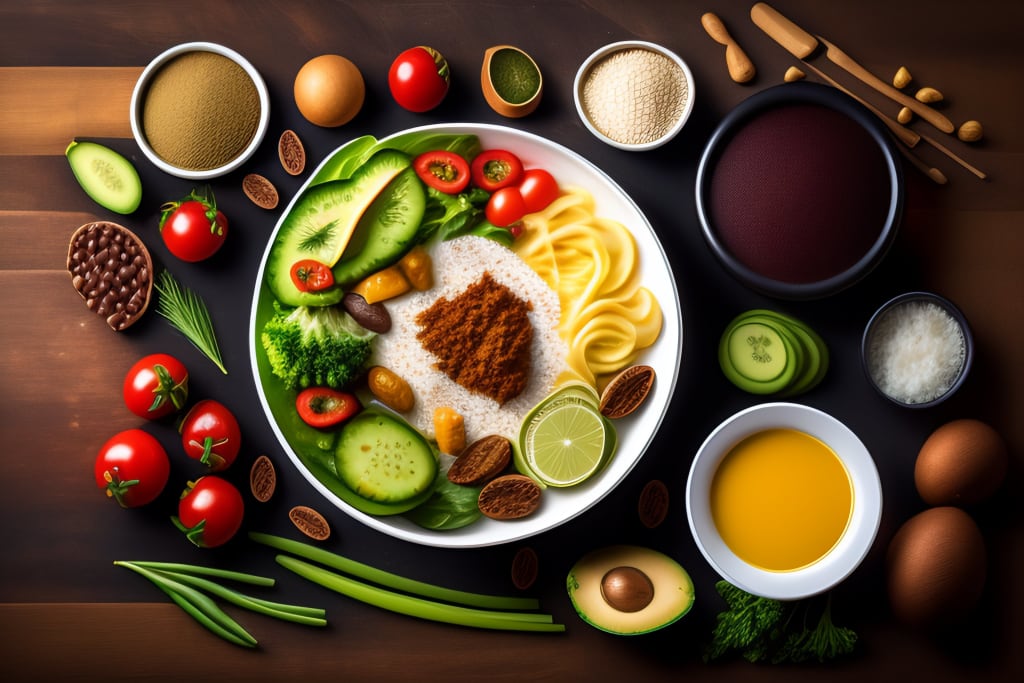THE ULTIMATE GUIDE TO EFFORTLESS WEIGHT LOSS: SAY GOODBYE TO DIETS AND WORKOUTS
Revolutionary Methods to Burn Fat and Lose Weight Without Breaking a Sweat

In today's fast-paced world, many individuals struggle to find the time and motivation to follow strict diet and exercise plans. However, it is still possible to achieve weight loss and burn fat without relying solely on traditional methods. By making small but effective changes to your daily routine and incorporating healthy habits, you can shed those extra pounds and improve your overall well-being. In this article, we will explore proven ways to burn fat and lose weight without the need for strict diets or intense exercise regimens.
Table of Contents
The Importance of Mindful Eating
Harnessing the Power of Smaller Plates
The Role of Protein in Weight Loss
Preparing Meals at Home for Healthier Choices
The Benefits of Fiber-Rich Foods
Hydration: Drinking Water for Weight Loss
Eliminating Electronic Distractions While Eating
The Impact of Quality Sleep and Stress Management
Cutting Out Sugary Drinks for Weight Loss
Incorporating Physical Activity into Your Routine
The Power of Portion Control
Mindful Snacking for Weight Management
Embracing Healthy Cooking Techniques
The Role of Metabolism in Weight Loss
Sustainable Habits for Long-Term Success
1. The Importance of Mindful Eating
When it comes to weight loss, how you eat is just as important as what you eat. Mindful eating involves paying attention to your body's hunger and fullness cues and savoring each bite. By practicing mindful eating, you can avoid overeating and make better food choices. Take the time to chew your food thoroughly and eat slowly, allowing your brain to register feelings of fullness. This way, you can consume fewer calories while still feeling satisfied.
2. Harnessing the Power of Smaller Plates
Did you know that the size of your plates can influence how much you eat? Using smaller plates for high-calorie foods can trick your brain into perceiving larger portion sizes. This visual illusion can make you feel more satisfied with smaller amounts of food. By reducing your plate size, you can control your portions without feeling deprived.
3. The Role of Protein in Weight Loss
Including an adequate amount of protein in your diet is essential for weight loss. High-quality protein sources such as lean meats, poultry, fish, eggs, legumes, and dairy products can increase feelings of fullness and reduce hunger. Additionally, protein plays a crucial role in building and repairing muscles, which can boost your metabolism and help you burn more calories throughout the day.
4. Preparing Meals at Home for Healthier Choices
One of the most effective ways to control your calorie intake is by preparing more meals at home. By cooking your own meals, you have complete control over the ingredients and portion sizes. Home-cooked meals tend to be healthier and lower in calories compared to restaurant or take-out options. Engage in meal preparation and explore healthy recipes to support your weight loss journey.
CLICK NOW TO GET FREE KETO RECIPES
5. The Benefits of Fiber-Rich Foods
Fiber-rich foods are not only beneficial for digestive health but also aid in weight loss. High-fiber foods such as fruits, vegetables, whole grains, and legumes provide volume and help you feel full for longer periods. By incorporating these foods into your diet, you can increase satiety and reduce overall food intake, leading to weight loss.
6. Hydration: Drinking Water for Weight Loss
Drinking an adequate amount of water throughout the day is essential for various bodily functions, including weight management. Consuming water before meals can help you eat fewer calories by creating a sense of fullness. Additionally, staying hydrated supports your metabolism and enhances overall well-being. Make it a habit to prioritize water intake and limit sugary drinks for optimal weight loss results.
7. Eliminating Electronic Distractions While Eating
In today's digital age, electronic distractions have become a common occurrence during meals. However, these distractions can lead to mindless eating and overconsumption of calories. To prevent this, practice mindful eating by avoiding electronic devices during mealtime. By focusing on your food and eating with intention, you can fully enjoy your meals and control your calorie intake.
8. The Impact of Quality Sleep and Stress Management
Getting enough quality sleep and managing stress levels are crucial aspects of weight management. Sleep deprivation can disrupt hunger hormones, leading to increased appetite and cravings for high-calorie foods. On the other hand, restful sleep supports hormone regulation and helps control appetite. Additionally, managing stress through techniques like meditation or exercise can prevent emotional eating and support weight loss efforts.
9. Cutting Out Sugary Drinks for Weight Loss
Sugary drinks, including soda, fruit juices, and energy drinks, can significantly contribute to weight gain. These beverages are loaded with empty calories and can lead to an increased risk of obesity and related health issues. By eliminating sugary drinks from your diet and opting for water, herbal tea, or infused water, you can reduce your calorie intake and support weight loss.
10. Incorporating Physical Activity into Your Routine
While this article focuses on ways to lose weight without exercise, incorporating physical activity can accelerate your progress and improve overall health. Engaging in regular exercise boosts your metabolism, increases calorie burn, and promotes fat loss. Find activities that you enjoy, such as walking, dancing, swimming, or cycling, and make them a part of your daily routine.
11. The Power of Portion Control
Controlling portion sizes is essential when aiming for weight loss. By being mindful of your portion sizes, you can avoid consuming excess calories. Use measuring cups, food scales, or visual cues to ensure you are eating appropriate portions. Over time, portion control becomes more intuitive, and you develop a better understanding of your body's needs.
12. Mindful Snacking for Weight Management
Snacking can often derail weight loss efforts, but it doesn't have to be that way. By choosing healthy, nutrient-dense snacks and practicing mindful snacking, you can stay on track with your goals. Opt for snacks that combine protein, fiber, and healthy fats to keep you satisfied between meals. Examples include Greek yogurt, nuts, seeds, fruits, and vegetables.

CLICK NOW TO GET THIS SNACK BOOK FREE
13. Embracing Healthy Cooking Techniques
In addition to preparing meals at home, adopting healthy cooking techniques can further enhance your weight loss journey. Opt for methods like grilling, baking, steaming, or sautéing instead of frying or deep-frying. These cooking techniques minimize the use of added fats and reduce the overall calorie content of your meals while preserving their flavor and nutritional value.
14. The Role of Metabolism in Weight Loss
Understanding your metabolism can be beneficial when trying to lose weight. Your metabolism is the process by which your body converts food into energy. Although genetics play a role in determining your metabolic rate, certain factors, such as increasing muscle mass through strength training or consuming metabolism-boosting foods, can help optimize your metabolism and support weight loss.
15. Sustainable Habits for Long-Term Success
Lastly, developing sustainable habits is crucial for long-term weight loss success. Avoid crash diets or quick-fix solutions that promise rapid results but are difficult to maintain. Instead, focus on making gradual changes to your lifestyle that you can sustain in the long run. This includes adopting healthy eating habits, staying active, managing stress, and prioritizing self-care.
Losing weight and burning fat without diet or exercise is possible by implementing these proven strategies. By practicing mindful eating, using smaller plates, incorporating protein-rich foods, preparing meals at home, consuming fiber-rich foods, staying hydrated, avoiding distractions, prioritizing sleep and stress management, cutting out sugary drinks, and incorporating physical activity, you can achieve your weight loss goals. Remember to focus on sustainable habits and make gradual changes for long-term success.
Frequently Asked Questions (FAQs)
Can I lose weight without following a strict diet or exercise routine?
Yes, by implementing the strategies mentioned in this article, you can lose weight without strict dieting or intense exercise.
How does protein contribute to weight loss?
Protein increases feelings of fullness, reduces hunger, and boosts metabolism, aiding in weight loss efforts.
Is it important to drink water for weight loss?
Yes, drinking water before meals can create a sense of fullness and help you consume fewer calories.
Can I lose weight by simply controlling portion sizes?
Portion control is a crucial aspect of weight loss, helping you avoid excess calorie intake and maintain a balanced diet.
Are there any shortcuts or quick fixes for weight loss?
Sustainable habits and lifestyle changes are key to long-term weight loss success, avoiding crash diets or quick-fix solutions.





Comments
There are no comments for this story
Be the first to respond and start the conversation.